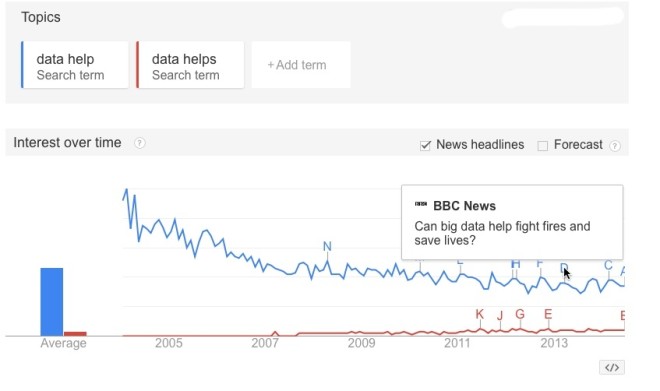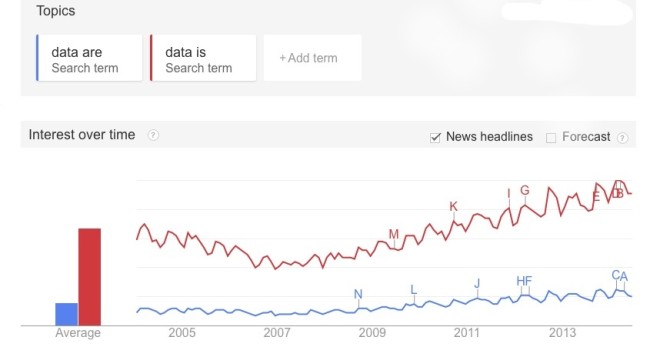“It's about time to start the meeting. Here are the agenda. Bob brought in some cappuccini in case anyone needs a little caffeine. Thanks, Bob.”
“You're welcome, Jeannine. Say, did anyone notice the graffito on the front of the building on your way in?”
The scenarios above sound ridiculous, don't they? The reason they sound funny is that the speakers are using words that English has borrowed from other languages and treating their plurals the way their original languages do.
It just doesn’t work: No one says cappuccini or graffito. But some people still get all hot and bothered about how to use the word data. And since that particular word comes up a lot here at New Relic (after all, we are all data nerds), we decided to look into what’s going on.
The big data question
In Latin, agenda is the plural of agendum, something to be done; and in Italian, cappuccini is the plural of cappuccino, while graffito would be what you call one piece of graffiti. But we pretty much dispense with all that when we use the words in English. There's “an” agenda and several cappuccinos—in fact, Microsoft Word's spell check suggests changing cappuccini to cappuccinos.
That brings us to data: The user testimonials on the New Relic home page and our billboards use headlines that all begin, “Data helps.” As in, “Data helps us make messaging more fun” and “Data helps us connect fans with great live events”—like that. Does that sound okay to you?
Data vs. datum
It sounds great to us, but some say it shouldn't. Data started out as the plural of datum, and you do sometimes encounter the latter form, mostly in scientific writing. So, the sticklers argue, we should be saying, “data help us,” not “data helps us.” Are they right?
Being the data nerds that we are, we clearly had to perform some analytics on the question. How do people usually use the word? We turned to Google Trends to find out.
First, we compared “data help” to “data helps” and learned that neither phrase turns up in searches very often. In June of 2014, Google recorded only 33 searches involving either phrase. While there were many more examples of “data help,” if you look at the sample headlines, some of the “data help” constructions—such as “can big data help...?”—aren't relevant to this discussion.

We get more hits if we compare “data is” to “data are.” In this case, “data is” clearly triumphs: June saw 88 searches for the singular construction and only 20 for the latter. “Data help(s)” may be an unusual search term in either form, but “data” with a singular verb is indeed pretty standard usage.
Data searches… and search results
What about the results of those searches? In our testing, Google returned about the same number of results for "data help" as for "data helps." But searching for “data is” produced about 57,300,000 results, while “data are” turned up "only” 26,000,000. In other words, data with a singular verb was more than twice as common as data as a plural.

What do the experts say? The Chicago Manual of Style—the bible for most non-newspaper grammar and style questions—defines a mass noun or a noncount noun as “one that denotes something uncountable, either because it is abstract... or because it refers to an indeterminate aggregate of people or things.” That sounds like the way we use data—we're not talking about an enumerated set of data points, but rather data as a concept. Section 5.8 of Chicago’s 16th Edition says, “as the subject of a sentence, a mass noun usually takes a singular verb.”
At least one prominent dictionary agrees: In the American Heritage Dictionary’s usage note on data, it says, “most notably in scientific usage, this plural usage is still common... But data is also standard in denoting a singular mass entity (like information), especially in writing for a more general audience.” The percentage of the dictionary's Usage Panel that accepts data in the singular has steadily increased over the past 25 years, and the dictionary now pronounces it “standard usage.”
If that’s not definitive enough, we polled LinkedIn’s Grammar Geeks group. There, 33 participants approved of data with a singular verb, at least in some contexts, while only 9 said “No, never!” Benjamin Lukoff, a writer, editor, and Web producer in the group, thinks the transition is done, writing that “data is an English word now, not a Latin one, so there's no reason we must still treat it as a plural.”
In our opinion, this is just another example of how data helps. Data has helped us clearly conclude that we're on solid ground when we proclaim: “Data helps…”
The views expressed on this blog are those of the author and do not necessarily reflect the views of New Relic. Any solutions offered by the author are environment-specific and not part of the commercial solutions or support offered by New Relic. Please join us exclusively at the Explorers Hub (discuss.newrelic.com) for questions and support related to this blog post. This blog may contain links to content on third-party sites. By providing such links, New Relic does not adopt, guarantee, approve or endorse the information, views or products available on such sites.


